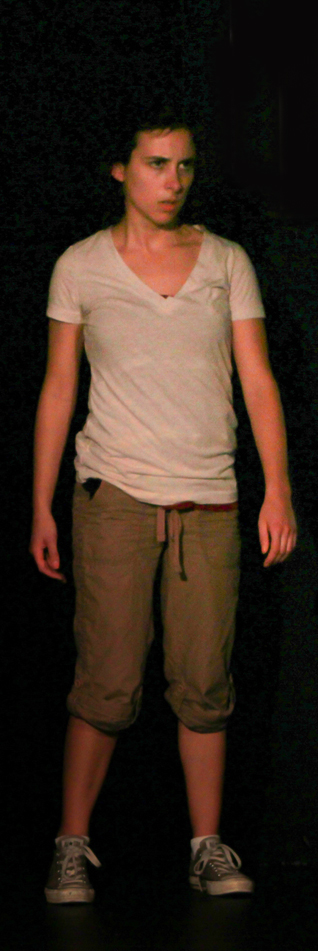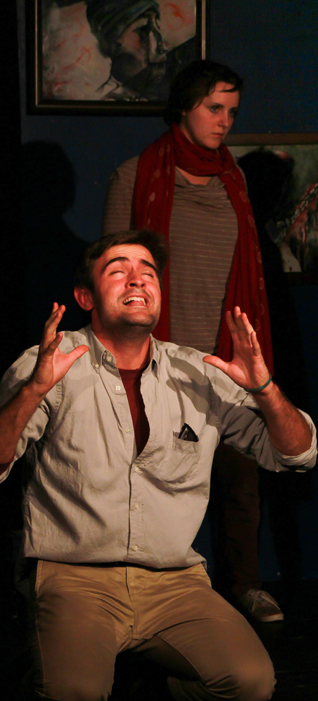Film/Stage
Kultars Mime
Staged at Harvard -
A Review
GURMINDER KAUR BHOGAL
KULTAR’S MIME: THE 1984 DELHI POGROM, AN EXHIBITION OF NEW ART, The Cabot Theater, Harvard University, Saturday, September 27, 2014
In Kultar’s Mime, art, music, and drama meld together to portray the massacre of thousands of Sikhs in India’s capital city, New Delhi, in November of 1984.
Often described as “the Delhi Riots” in the Indian and international Press, this touching play makes amply clear that the deliberate way in which Sikh men and their families were hunted down and persecuted by the Indian government constituted no “riot,” a term whose definition suggests an element of spontaneity as underscored by one of the co-directors, Sarbpreet Singh.
The well-prepared cast read a variety of documents (scholarly articles, journalistic propaganda) to understand the deliberate planning and strategizing that went into orchestrating this massacre.
It was a pogrom, Kultar’s Mime argues, one where the governing Indian Congress party brutalized an entire community to avenge the assassination of Prime Minister Indira Gandhi by two of her body guards, both Sikhs.
The play is based on a poem, Kultar’s Mime, written by Sarbpreet Singh who in 1984 was a young man studying at College. The protagonist of his poem -- based on a true story -- a young boy named Kultar, cannot hear or speak. Having witnessed the hanging of his father by military goons, Kultar is haunted by this tragedy and lives this fateful moment again and again through mime.
It is by miming that he is able to explain what he witnessed to Veena Das, Professor of Anthropology at Johns Hopkins University, who spoke to many of the widows and their children in the wake of the massacre.
Along with two of the stories contained in Das’s work, the directors J. Mehr Kaur and Sarbpreet Singh dramatize other tales that speak of rape, bodies being burned alive, violence, humiliation. Painful memories haunt the Sikhs from one generation to the next. And yet, the clinical term for this condition, post-traumatic stress disorder, doesn’t even come close to capturing what the actors communicated so powerfully in this harrowing narrative: Sikhs are people like you and me; we are the perpetrators of such crimes, we are the victims; ordeals such as these are endured by people at this very moment all over the world. Still.
The cast and directors of Kultar’s Mime make a comparison with the massacre of Jews in the Kishinev Pogrom of 1903 to widen the social relevance of this play.
Interspersed with haunting raag-based melodies composed and adapted by Sarbpreet Singh, the audience is suspended between a state of disbelief -- how could this happen? -- and hope -- surely, we can learn from this.
Each cast member gave a compelling performance full of spirit, cruel irony, tears, and courage.
This play will undoubtedly educate and inform audiences as it travels to India and Canada. The sensitivity with which this historical event is treated here will also urge audiences to remember the atrocities of 1984 while reflecting on the numerous guises in which we allow them to continue unfolding all around the world.
[Gurminder Kaur Bhogal is Associate Professor in Music at Wellesley College, Massachusetts, USA. Her research interests include twentieth-century French music and art; and Gurbani Kirtan / Gurmat Sangeet. She teaches a variety of courses in music history and theory in the Department of Music.]
October 1, 2014
Conversation about this article
1: Sarvjit Singh (Millis, Massachusetts, USA), October 01, 2014, 2:09 PM.
This was a captivating performance and orchestration. The acting and oratory was at its finest. Kudos to actors, writer and directors! It brought tears to the eyes. Looking back at 1984 when I almost became a victim like Kultar, it was emotional. I have not been able to discuss the pogrom with anyone since then. A minor constructive criticism would be to include some kind of hope element in this performance because it would be unfair otherwise to not mention countless Hindus who helped Sikhs either by hiding them or bringing food supplies, etc. Even some Hindu Policemen saved Sikh lives.
2: N Singh (Canada), October 01, 2014, 7:59 PM.
#1: 'Countless Hindus who helped save Sikhs"? An overstatement if ever there was one. Is that why over 30,000 Sikhs died including those in other areas outside of Delhi?
3: Sarvjit Singh (Massachusetts, USA), October 01, 2014, 8:49 PM.
N Singh ji: Neither my family nor I nor many other Sikhs would be alive today if some Hindus did not help us. My comment does not diminish the violence by the majority of the Hindus during and around 1984. It would be very unfair of me to not mention those, no matter how few, who helped Sikhs. Their number is no doubt a fraction in comparison to the bad ones, but still, they existed.
4: G C Singh (USA), October 02, 2014, 1:09 AM.
The efforts of these young children should be encouraged and supported to tell the story of 1984 in a novel way. I do not know the whole story / dialogues of the play and only watched a very short promo on their fundraising website therefore I may be mistaken for pointing out a vital error in narration. It talks about 3000 Sikhs being killed in "retaliation" for the death of Indira Gandhi without mentioning the context. Although the number of those who were massacred was much higher, the narrative itself needs some correction. It was Indira Gandhi who ordered 70,000 Indian army personnel to attack the Golden Temple and butcher thousands of innocent Sikhs and therefore in "retaliation" and to punish her for her crimes, she was shot dead by her two Sikh body guards. There was no "retaliation" by the general public for her death and there were NO Hindu-Sikh riots. It was her son Rajiv Gandhi and his cousin Arun Nehru who ordered the state machinery to organize the mass murder of tens of thousands of innocent Sikhs throughout India to earn a huge windfall of Hindu votes in the next elections which were immediately announced after the massacre of the Sikhs.




